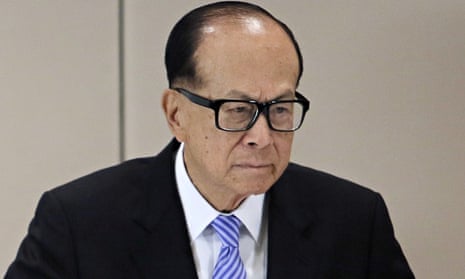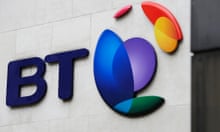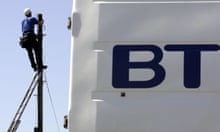Asia’s richest man is poised to take control of the UK’s biggest mobile phone network, after Three announced it had started exclusive takeover talks with its larger rival 02.
Li Ka-shing has an estimated fortune of $34.1bn (£25.5bn) from his sprawling empire of ports, utilities and property, according to Forbes. His conglomerate, Hutchison Whampoa, is the parent company of Three, which confirmed it was ready to pay £10.25bn, mostly in cash, for larger rival 02. The deal would create the UK’s largest mobile phone firm with 31.5 million customers, cutting the number of network owners in the UK from four to three.
It would also make Li one of the biggest foreign investors in the UK. The octogenarian Hong Kong tycoon’s UK portfolio includes the health and beauty chain Superdrug and Northumbrian Water. Last week, he paid more than £1bn for the Eversholt Rail Group, which owns nearly a third of Britain’s trains.
Known as “Superman” in Hong Kong, Li built his fortune from exporting plastic flowers in the 1950s and has amassed companies in more than 50 countries. Most recently, he has been snapping up mobile networks around Europe, buying Orange in Austria and O2 in Ireland.
Consumer experts warned that if the takeover went ahead, millions of mobile phone customers in the UK could face higher bills for calls and data.
As recently as 2010, the UK had five network owners and a fiercely competitive market. But that became four when Orange and T-Mobile merged to form EE. Although the UK telecoms regulator, Ofcom, has long said it wants to retain four competing mobile firms in the UK, the final decision on whether to let the deal go ahead will rest with European Union competition authorities in Brussels. They have previously waved through similar deals in Germany, Austria and Ireland.
Last year, the European commission gave the green light to Telefónica’s €8.6bn (£6.4bn) takeover of German operator E-plus. This was seen as a watershed moment because it was the first time the mobile market went from four to three competitors in a large EU country. “It will be very difficult for the EU regulators not to approve the deal,” said Guy Peddy at Macquarie, citing the German precedent.
Imran Choudhary, consumer insight director at Kantar Worldpanel, said: “In the short term, this could lead to value-for-money propositions and impressive deals as the new providers compete for market share. Longer term, however, a smaller number of big players may make the pricing less competitive.”
Richard Lloyd, the executive director of consumer group Which?, said: “Fewer players in an essential market like telecoms is rarely a good thing for consumers and competition, and both O2 and Three already have work to do to improve their customer satisfaction ratings.”
Profits in the UK telecoms industry have been in decline as consumers tire of endless updates to their handsets, forcing the industry to come up with other inducements to get consumers to switch providers.
Since its launch in 2003 with what rivals dismissed as a patchy 3G mobile internet service, Three has kept competitors on their toes with unlimited mobile data and cheap roaming. The proposed deal will catapult it to first place in the UK market with a 41% market share, ahead of EE, which will have 32%, and Vodafone in third place with 24%.
“The UK has a reputation as one of the most cut-throat mobile markets in the world and the move towards quad play – where home phone, broadband, TV and mobile services come from a single supplier – should keep competition fierce,” said Ernest Doku, telecoms expert at the USwitch price comparison site.
Although the deal “raised questions” about competition, he said the combined company would have to invest in next-generation 4G networks to win over “increasingly savvy” customers, who care about the speed of downloading videos to their phone. “The intention to play in the mobile market is going to necessitate that investment.”
Li Ka-shing’s UK empire
From smartphones to sewage treatment, perfume to power lines, 86-year-old Li Ka-shing has a long list of business interests in the UK.
But the £10.25bn deal being negotiated between his conglomerate Hutchison Whampoa and Telefónica’s O2 would be his biggest stake yet.
Hong Kong-based Li already owns retail chains Superdrug, The Perfume Shop and Savers, together with the ports of Harwich, Felixstowe and London Thamesport. Worldwide he controls some 13% of container port capacity. Li also owns UK Power Networks, which runs electricity cables in south-east England.
This week he added Eversholt Rail to his portfolio. His Cheung Kong Group also owns Northumbrian Water, Wales and West Utilities and has a stake in Southern Water. Jennifer Rankin







Comments (…)
Sign in or create your Guardian account to join the discussion